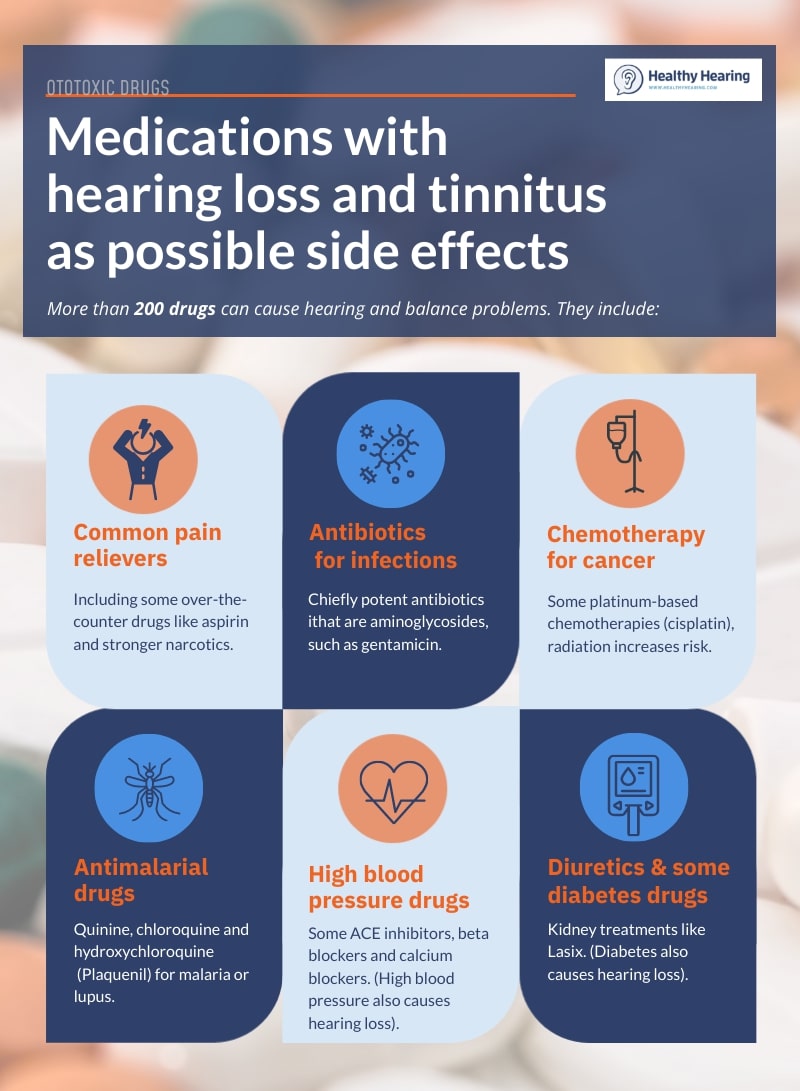|
www.HealthyHearing.com |
Frequent use of pain relievers linked to tinnitus2022 study adds to understanding of how some drugs can trigger hearing problems
Contributed by Joy Victory, managing editor, Healthy Hearing Women who report frequent use of certain pain relievers are more likely to report experiencing tinnitus, according to a 2022 data analysis from the Nurses’ Health Study II. The analysis included nearly 70,000 women. 
hearing problems, including tinnitus. This new study sheds more light on the risks related to pain relievers. The longitudinal study looked at the overlap between women who take common pain relievers and a history of tinnitus, or ringing in the ears. The researchers surveyed women about their use of pain relievers, including aspirin, acetaminophen, NSAIDs (e.g., naproxen and ibuprofen), as well as prescription drugs like celecoxib, a COX-2 inhibitor. "Frequent use" was defined as taking the medication every day or almost every day. Specifically, the study found:
Ototoxic drugs can be harmful to hearingIn a news release about the study findings, the research authors said more study is needed, as the study was not designed to prove whether pain relievers cause tinnitus. However, people should still be mindful that all drugs carry side effects. “OTC analgesics (pain relievers) clearly have benefits with short-term use. However, frequent use of these medications and use over long periods of time may increase the risk of tinnitus and may cause other adverse health effects," said lead author Sharon Curhan, MD, ScM, of the Brigham’s Channing Division of Network Medicine. "Therefore, it is important to take these medications mindfully and to limit their use as much as possible, and to discuss any change in medication use, whether prescription or non-prescription, with your health-care provider.” The study isn't the first to surface a link between common pain relievers and tinnitus. Several other studies have shown that pain relievers may cause hearing loss and tinnitus, but generally only after prolonged use of very high doses. When that happens, the damage is usually reversible after the drugs are stopped. Besides pain relievers, there are many other "ototoxic drugs," which means they carry side effects that can trigger or worsen hearing loss, tinnitus and dizziness. For example, high blood pressure drugs have been linked to tinnitus.
Tinnitus is very commonAbout 1 in 10 people report frequent tinnitus. The symptoms (or sound) can vary a lot and may come and go. Tinnitus has many potential causes. Some people report their diet worsens their tinnitus, for example. However, most of the time the cause is not known. One thing that is clear—tinnitus and hearing loss often go hand-in-hand. As the ear's fragile hair cells deteriorate, tinnitus can be more common. Related:
Note: This piece originally published in July 2022. It was updated and medically reviewed in July 2023 by Dr. Patricia Weiser, a licensed pharmacist and medical writer. She obtained her Doctor of Pharmacy degree at the University of Pittsburgh. Joy Victory, managing editor, Healthy Hearing
Related Help Pages:
Tinnitus (ringing in the ears) Symptoms Causes Treatment Meniere's disease Dizziness
|
Featured clinics near me
Earzlink Hearing Care - Reynoldsburg
7668 Slate Ridge Blvd
Reynoldsburg, OH 43068

Find a clinic
We have more hearing clinic reviews than any other site!



 Joy Victory has extensive experience editing consumer health information. Her training in particular has focused on how to best communicate evidence-based medical guidelines and clinical trial results to the public. She strives to make health content accurate, accessible and engaging to the public.
Joy Victory has extensive experience editing consumer health information. Her training in particular has focused on how to best communicate evidence-based medical guidelines and clinical trial results to the public. She strives to make health content accurate, accessible and engaging to the public.